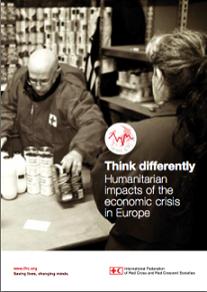IFRC, (2013), Think differently: Humanitarian impacts of the economic crisis in Europe, Geneva: International Federation of Red Cross and Red Crescent Societies. During the first half of 2013, the International Federation of Red Cross and Red Crescent Societies (IFRC) carried out a mapping exercise across the 52 National Red Cross and Red Crescent Societies in Europe and Central Asia (IFRC Europe zone). 42 National Societies responded and this report is …Read More
OECD Skills Outlook 2013
OECD, (2013), OECD Skills Outlook 2013: First results from the survey of adult skills, Paris: OECD. Key Findings of the Survey Progress across generations Some countries have made impressive progress over recent decades in equipping more people with better literacy and numeracy skills. Young Koreans, for example, are outperformed only by their Japanese peers, while Korea’s 55 to 64 year-olds are among the three lowest-performing groups of this age. Older …Read More
The Human Capital Report
World Economic Forum, (2013), “The Human Capital Report”, World Economic Forum, Οκτώβριος. The Human Capital Report details the findings of a new Index which measures countries on their ability to develop and deploy healthy, educated and able workers through four distinct pillars: Education, Health & Wellness, Workforce & Employment and Enabling Environment. Δείτε επίσης σχετικό άρθρο του Δ. Κατσαγάνη στο Capital.gr. Σχετικές Αναρτήσεις De Molli, V., (2013), “European Best …Read More
A Cautionary Tale: The true cost of austerity and inequality in Europe
Oxfam, (2013), “A Cautionary Tale: The true cost of austerity and inequality in Europe”, Oxfam Briefing Paper, 12 Σεπτεμβρίου. European austerity programmes have dismantled the mechanisms that reduce inequality and enable equitable growth. With inequality and poverty on the rise, Europe is facing a lost decade. An additional 15 to 25 million people across Europe could face the prospect of living in poverty by 2025 if austerity measures continue. Oxfam …Read More
Euro-Zone Unemployment Unlikely to Fall Quickly
Billington, I., (2013), “Euro-Zone Unemployment Unlikely to Fall Quickly”, The Wall Street Journal, The Euro Crisis Blog, 10 Σεπτεμβρίου. The euro zone may have emerged from recession this year, but unemployment is unlikely to fall quickly with companies less likely to hire staff in the final three months of the year than they were earlier in 2013, a survey of employers showed Tuesday. The quarterly Manpower Employment Outlook shows that, while there …Read More
Social Protection Rights of Economically Dependent Self-employed Workers
Eichhorst, W., Kahanec, M., Kendzia, M., Wehner, C., et al. (2013), “Social Protection Rights of Economically Dependent Self-employed Workers”, IZA Research Report, N. 54. The study analyses the role of economically dependent self-employed workers in the labour market by taking institutional factors into account, such as labour law and social protection rights. In addition to setting out the reasons for the increase of dependent self-employed workers, the authors provide case studies across …Read More
Benchmarking Working Europe 2013
ETUI, (2013), “Benchmarking Working Europe 2013”. Widening economic and social gaps among EU member states, as well as among different groups and categories of citizens within society, are not only placing in jeopardy the future of Social Europe but threatening to undermine also the whole project of European integration. The post-2008 recession and debt crisis, helped along by EU leaders’ obstinate clinging to the failing remedies of fiscal austerity, have …Read More
Combining the Entry of Young People in the Labour Market with the Retention of Older Workers
IZA, (2013), “Combining the Entry of Young People in the Labour Market with the Retention of Older Workers”, IZA Report, N. 53. This study provides an overview of the employment situation of young and old workers in the EU Member States, setting out the most recent developments during the crisis and dealing with policies implemented to promote the employment of both groups. The evidence collected shows that there is no …Read More
Eurostat: European social statistics
Eurostat, (2013), “European social statistics”, 2013 edition. The pocketbook European social statistics, intended for both generalists and specialists, provides a comparative overview of the social statistics available in 27 Member States and the Candidate Countries of the European Union, as well as in the EFTA states. Different areas of the social field are described here by a selection of indicators which are presented in tables and graphs and accompanied by …Read More
Standard Eurobarometer, N. 79
European Commission, (2013), “Standard Eurobarometer”, N. 79, Spring 2013. This report presents the first results of the Standard Eurobarometer 79 survey, which was carried out between 10 and 26 May 2013 in 34 countries or territories1: the 27 European Union Member States, the six candidate countries (Croatia, the Former Yugoslav Republic of Macedonia, Turkey, Iceland, Montenegro and Serbia), and the Turkish Cypriot Community in the part of the country that …Read More






